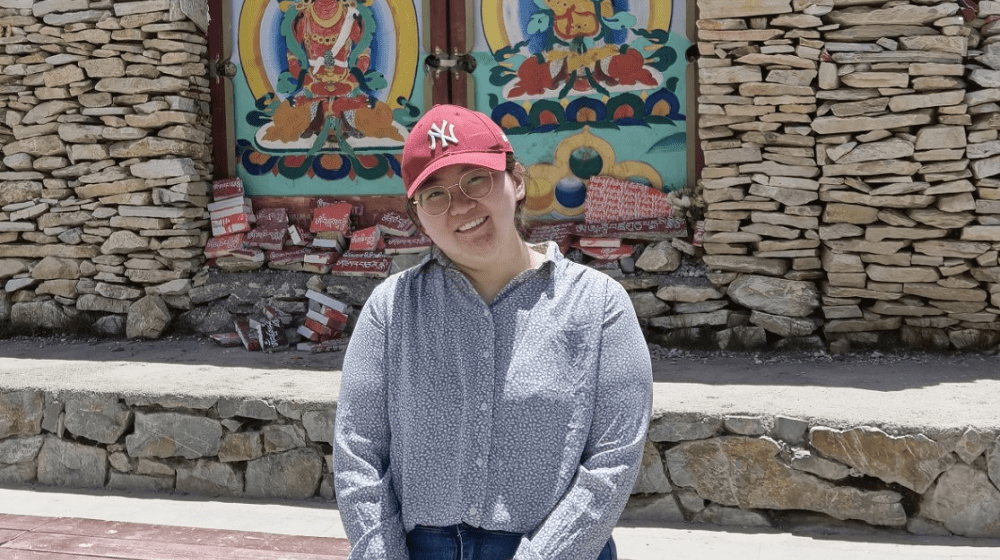"All Chinese young people can choose to be healthy, and let us arm ourselves with sexual and reproductive health knowledge and skills to fulfill everyone’s potential." – Aimin, a UN Volunteer in China
Aimin, 28-year-old, from Inner Mongolia, is a United Nations Volunteer in China. She has been seconded to UNFPA’s long-term partner China Family Planning Association since 2019, to support the coordination of a local project in Qinghai and Shanxi Provinces. The project aims to improve the sexual and reproductive health and rights of women and young people including the Tibetan ethnic minorities in rural areas.
As the project is coming to an end, we interviewed Aimin, to learn about her story with the project, and how she has been growing with young people, as a project coordinator.
How did you learn about the project and how did you become a UN volunteer?
I learned about this project through my volunteerism and internship with CFPA in 2019. Actually, when I was a university student in Shanghai in 2013, I had known a little about CFPA and UNFPA, because they had been supporting China Youth Network, a youth volunteer organization dedicated to young people’s sexual and reproductive health and rights for a long time. I was then a core member of the Shanghai branch, and participated regularly in its peer education activities in Shanghai.
When I noticed UNFPA was looking for a young person to coordinate a local project implemented by CFPA via the UN Volunteer Organization, I submitted my application without hesitation. I applied for the post because not only I had the required work experience on young people’s sexual and reproductive health and rights, but also my interest and commitment in this area. I was lucky to be selected to do this job.
Why do you focus on young people’s sexual and reproductive health and rights?
There are many reasons behind that. First, from my own experience of living in Inner Mongolia, I had heard about adolescent girls who gave birth in the bathroom, without any knowledge about pregnancy. I was a school student, and these kinds of stories really shocked me as the girls were just my age. At that time, the internet was not as widely available in my hometown as it is now - any many people did not want to discuss anything on sexual and reproductive health publicly. However, things like adolescent pregnancies did happen.
Secondly, I feel young people need to make informed decisions about their sexual and reproductive life. It’s not like my childhood, now young people are living in a more open and diversified culture. The internet is easily available to search for information, but still, it is hard for young people to tell what’s the correct information and what’s incorrect.
You mentioned the information gap of young people on sexual and reproductive health. How about the young people in Qinghai and Shanxi where the project is taking place? Are they having the same issue and how did you help?
I find the lack of sexual and reproductive health information is a common issue for young people, regardless of which province he or she is from. In Qinghai and Shanxi where I supported the training of local youth leaders, I learned from them that the local young people were facing some similar challenges as those from the metropolitan cities of Shanghai or Beijing. For example, unintended pregnancy. By developing these young leaders, they can disseminate the knowledge on contraception to more peers in their colleagues and communities so as to avoid unintended pregnancy.
The other interesting thing I find is that, compared with young people, adolescents in the two provinces require more basic information on their bodies, e.g. menstruation, morning erections. For this, I have maintained close contact with the local schools, to understand the students’ needs, and coordinated in providing age-appropriate and culturally-sensitive sexuality education to students of different ages and places.
In terms of youth leadership, do you want to say something to young people in China?
Empower yourself and be confident! “We are the first responsible person for our own health and life,” I always use this adage to motivate myself. Only when you are equipped and responsible are you able to mobilize and influence more people.
I have really appreciated the four years with UNFPA and CFPA as I’ve been able to work with and for young people on a wider platform with both national and international organizations. So, never stop trying, and be ready for your next challenge!


